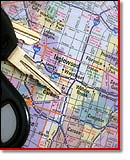Most seniors develop strategies for dealing with slower reflexes,
deteriorating eyesight and other physical changes. There are ways
for seniors to become safer drivers, for their own benefit and for the benefit of others,
and perhaps prolong the number of years they can safely take to
the road.
Seniors can take the following actions to become more confident
on the road:
Use the "three-second rule"
The three-second rule is designed to help keep a safe
distance between your car and the car in front of you. Using a
landmark of some sort, begin counting as the
vehicle in front of you just passes it. Try to maintain a time
distance of at least three seconds before you reach the same
landmark.
Do not let yourself become distracted
Give all of your concentration to driving.  Turn off the radio, and don't use a cell phone.
Turn off the radio, and don't use a cell phone.
Plan your route beforehand
If you are planning on traveling to a place for the first time,
use maps to familiarize yourself with the street names and distances between
turns. If the trip is short enough, you can also drive trial runs, particularly
if you will be traveling at night or if bad weather is predicted.
Have a driving buddy
Another set of eyes can help by reading maps, finding
addresses and looking for landmarks. While this is also a good
way to maintain social contacts, it is important that the other
person does not distract you. And experts caution that a passenger
will not be able to give instructions in unexpected and dangerous
situations where instant decisions and reflexes are required.
Do not depend on your driving buddy to help you avoid accidents
-- you should drive only if you are confident of your own ability
to respond to sudden danger.
Be honest with yourself about your ability
to drive
Ask friends and loved ones about your skills and be
prepared to deal with their comments.
Know your strengths and weaknesses
After every incident of poor driving or a near miss,
it is also important to reflect on what happened. Ask yourself
if you could have prevented it, or what you might have done
differently to better respond to such an event.
There are many other strategies that seniors can use, such
as avoiding trips while under stress, having regular
checkups for hearing and vision, and others that you can
learn about by attending a senior driving class or doing
research on the Web.

